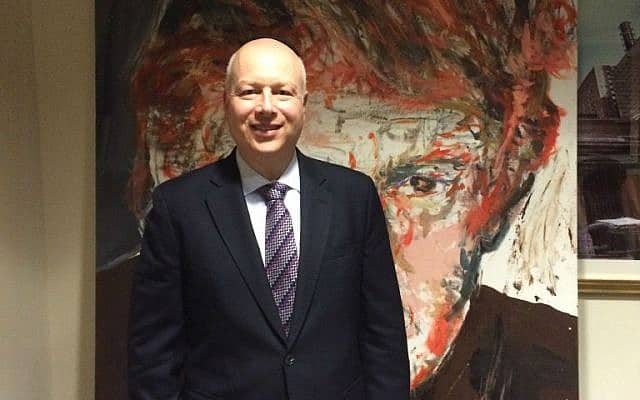The Legacy Of Jason Greenblatt’s Diplomatic Service

Jason Dov Greenblatt, the Trump administration’s “special representative for international negotiations,” resigned on September 5. Greenblatt—along with Trump’s advisor and son-in-law, Jared Kushner, and Washington’s ambassador to Israel, David Friedman—was responsible for formulating a plan to resolve the decades-old Palestinian-Israeli conflict. Greenblatt’s decision to resign before the administration released its so-called “Deal of the Century” (a.k.a. the Kushner-Greenblatt plan), which will not happen until after Israel’s elections later this month—assuming it happens at all—may have been partly motivated by the heavy criticism the plan has already taken.
Regardless, Greenblatt leaves behind a dark legacy that will unfortunately taint U.S. foreign policy long after Donald Trump himself exits the White House. Greenblatt and others in the administration were behind decisions such as recognizing Jerusalem as the Israeli capital, cutting all U.S. funding for the United Nations Relief and Works Agency, and shutting down the Palestinian Liberation Organization (PLO)’s DC office, which aligned the White House with Prime Minister Benjamin Netanyahu’s government to the maximum extent seemingly possible. Depressingly, it is difficult to imagine how a future U.S. administration could reverse the damage caused by such hardline anti-Palestinian policies.
Put simply, the Kushner-Greenblatt plan was “dead on arrival,” rejected by virtually all Palestinians across the political spectrum. Although its details have not yet been made public, some information about the plan has been leaked, confirming that it would mark the end of even nominal U.S. support for a two-state solution. At least based on what we do know about it, the “Deal of the Century” would consolidate Israel’s occupation of Palestinian land and oblige the Palestinians to accept a permanent state of dehumanization and indignity in exchange for some money that the White House wanted to see oil-rich Arab states in the Gulf Cooperation Council (GCC) fork over for Palestinian “economic development.”
Ultimately, however, Greenblatt’s resignation was significant not because of the likely failure of his “Deal of the Century,” but because of what the envoy did achieve, as explained by Michael Young, the senior editor at the Carnegie Middle East Center. Greenblatt, a former Trump Organization lawyer, played an important role in bringing the White House and Netanyahu’s government into an alignment that was closer than that of any past U.S. administration and Israeli government. Most likely, any hope for a two-state solution has been irreversibly undermined by the Trump administration’s pro-Netanyahu positions. The odds are good that between now and the next U.S. presidential election, Trump will recognize the legitimacy of Israeli control of the West Bank, further undermining any future U.S. effort to bring Palestinians and Israelis closer to a just and lasting peace. Indeed, that is Greenblatt’s legacy as an American diplomat.
Undoubtedly, Palestinians are saying good riddance after Greenblatt, who backed the most extreme positions of the Israeli government, announced his resignation. Yet as a fervent supporter of Israel’s colonization of the West Bank and East Jerusalem, Greenblatt pushed an agenda that was not only dangerous for Palestinians, but also for the Jewish State’s future. By throwing away decades of negotiations aimed at reaching a two-state solution in line with the international consensus on how to resolve the Palestinian-Israeli conflict, the U.S. has left Israel worse off. In Young’s words, “as many Palestinians watch their principal demands—one a state, Jerusalem, and refugees—undermined by the Trump administration, the risk is that they will conclude that since negotiations brought them nothing, perhaps violence can.” Now facing an “irresolvable dilemma,” the Israelis must contend with facts on the ground. “The Palestinians won’t disappear and in the decades ahead Israel will struggle with what to do with them.”
Looking ahead, by tasking long-time supporters of the “Greater Israel Project” like Greenblatt with the responsibility of developing an Israel-Palestine peace plan, Trump has established a new normal that changes the conflict’s equilibrium in a dangerous way. Without the U.S. even nominally supporting the establishment of a sovereign Palestinian state, the prospects for peace between the Palestinians and Israelis are dimmer than they have been at any time since Israel’s official establishment in 1948. By appointing Greenblatt—a real estate lawyer with zero diplomatic experience and an overwhelming bias in favor of Israel—to lead efforts to solve one of the most sensitive problems in foreign affairs, Trump has pushed Palestinians toward greater desperation, Israel toward a seemingly unsolvable dilemma, and the U.S. even further away from any respected position of leadership in the Middle East.
The legacy of Jason Greenblatt’s diplomatic service is dark and disturbing. As Hussein Ibish, a Senior Resident Scholar at the Arab Gulf States Institute in Washington, put it: Greenblatt “acted as a dangerous extremist” who was “against all things Palestinian, without exception” and did “tremendous, historic damage” in his capacity as an envoy for the Trump administration.





